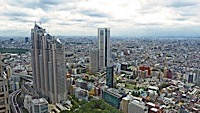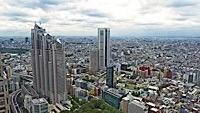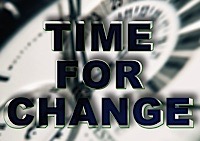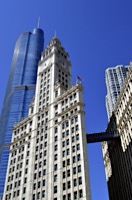 ‘What is my business worth?’ is a question every entrepreneur and investor asks themselves all the time. Then when it comes to selling the company or raising money the question shifts subtly to ‘what value will the investor/acquirer place on my business?’. The answer to the second question is often lower than the answer to the first one.
‘What is my business worth?’ is a question every entrepreneur and investor asks themselves all the time. Then when it comes to selling the company or raising money the question shifts subtly to ‘what value will the investor/acquirer place on my business?’. The answer to the second question is often lower than the answer to the first one.
If you are trying to answer the question ‘what value will an investor place on my business?’ I think there are three things you need to understand. The first is what I would describe as the right way for a VC to value a company, the second are the rules of thumb that we use to sense check and short cut the proper analysis, and the third is the impact of market forces on the numbers thrown out by the first two.
innovation DAILY
Here we highlight selected innovation related articles from around the world on a daily basis. These articles related to innovation and funding for innovative companies, and best practices for innovation based economic development.
How To Get Your Emails Read
 Last night I did my annual "fireside chat" with the InSITE Fellows followed by beers at a local bar. This has become a tradition and one that I enjoy very much. We ended up at Amity Hall where we drank beer, hung out, watched the Knicks do a late game fade against Orlando, and talked a bit of shop. Nishta asked me how to get to her email read. We had some fun with that and turned it into an experiment (yes, she automatically got into my priority inbox) and then a test. I'll let her tell the story:
Last night I did my annual "fireside chat" with the InSITE Fellows followed by beers at a local bar. This has become a tradition and one that I enjoy very much. We ended up at Amity Hall where we drank beer, hung out, watched the Knicks do a late game fade against Orlando, and talked a bit of shop. Nishta asked me how to get to her email read. We had some fun with that and turned it into an experiment (yes, she automatically got into my priority inbox) and then a test. I'll let her tell the story:
I mentioned something and he said, “send me an email”. I instantaneously and quite unconsciously replied, “oh come on, you don’t check your emails.” And he said, “I do”. After 2 mins of back and forth, he took out his (Android) and showed me his inbox — sorry, his priority inbox. He said, “see that email, now thats a nice subject, I will check it.” “But what if my email gets stuck in your regular inbox?” was my immediate question? “Then, nothing can happen. So you need to at least make it to my priority inbox, can you?” “I will find a subject interesting enough for you then” He smiled and said, “lets try”. I did and both of my emails eventually showed in his prioirity inbox few mins later!
Wearable Sensor Reveals what Overwhelms You - Technology Review
 What do you think most stresses you out during the day? A new type of wearable stress sensor, which constantly checks for signs of anxiety, could give you a precise answer. And it might not be what you think.
What do you think most stresses you out during the day? A new type of wearable stress sensor, which constantly checks for signs of anxiety, could give you a precise answer. And it might not be what you think.
That's what I found when I tested the Q Sensor, a device made by Affectiva, a company based in Waltham, Massachusetts. It looks like a large digital watch with no readout. A button on its surface lights up in different colors to convey the level of battery charge. Two small silver electrodes on the underside of the device continually send out a low electric current to measure skin conductance. Skin conductance rises along with physiological levels of stress, including both excitement and fear.
TEDCO Gains International Recognition and Attention - Citybizlist
 Columbia, Md., - Since its inception more than a decade ago, The Maryland Technology Development Corporation (TEDCO) has garnered national recognition for its early-stage investment track record and support of emerging innovations. Today, the organization is gaining international attention for its successful technology transfer programs and business models. Henry Ahn, program manager for technology funding programs and Stephen Auvil, vice president of technology transfer and commercialization, presented information on TEDCO to foreign economic panels from China and technology transfer professionals from Russian universities.
Columbia, Md., - Since its inception more than a decade ago, The Maryland Technology Development Corporation (TEDCO) has garnered national recognition for its early-stage investment track record and support of emerging innovations. Today, the organization is gaining international attention for its successful technology transfer programs and business models. Henry Ahn, program manager for technology funding programs and Stephen Auvil, vice president of technology transfer and commercialization, presented information on TEDCO to foreign economic panels from China and technology transfer professionals from Russian universities.
"We are proud of our unique funding programs and are honored to gain international exposure and recognition through these speaking engagements," said Rob Rosenbaum, president and executive director of TEDCO. "The TEDCO business model is solid and effective and we take great pride in it being emulated across the U.S. and abroad."
Minorities Like Me: the Minority-Led Startup Gap and What It Means for Our Future | Black Web 2.0

For the past two years, I’ve been spreading the message that people of color are missing out on the technology start-up revolution. In an era where young companies can surpass the market-caps of companies that have been in existence for decades and can go on to raise millions in funding — creating jobs and opportunities for others, we are notably absent. It’s a topic that almost no one wants to touch. Technology conferences brush over the concept by focusing their “lack of diversity” panels on low numbers of women leading startups rather than tackle the almost complete absence of African Americans and Hispanics founders. Instead they highlight minority celebrities that have taken an interest in the space to make a passive attempt to show “look, they are here.”
Eight Things Stand-Up Comedy Teaches Us About Innovation | Co.Design
Comedy, especially stand-up, is widely regarded as the most difficult gig in show business. Similarly, successful product innovation is so difficult, it could be regarded as the stand-up comedy of the business world.
E.B. White once said that analyzing comedy is like dissecting a frog: Few people are interested and the frog dies of it. However, a sacrifice must be made to help more great ideas see the light of day, and studying how good comedians work can reveal insights into how innovation can benefit from the same advice.

Virginia Legislature Approves $15M for R&D Initiatives | Business Wire
RICHMOND, Va.--(BUSINESS WIRE)--The 2011 Virginia General Assembly is being hailed as one of the most productive legislative sessions for the bioscience industry in the last decade. After months of preparation, outreach and dogged advocacy, volunteers and representatives from the Virginia Biotechnology Association scored victories for emerging bioscience companies on every item on its ambitious legislative agenda.
“Governor Bob McDonnell, Lieutenant Governor Bill Bolling, Speaker of the House Bill Howell and a bipartisan team of leaders from both chambers of the General Assembly deserve our sincere thanks for passing new job-creating new programs such as the R&D Tax Credit,” said Thomas Thorpe, chairman of the Virginia Biotechnology Association and President of Afton Scientific, a Charlottesville-based bioscience company. “Investments in high-growth, high-wage, 21st Century industries, such as the biomedical sciences, are key to Virginia’s future as a reliable destination for innovators, entrepreneurs and skilled workers.”
Silicon Valley: A big bright heat lamp for startup incubation - Opinion - Ottawa Business Journal
 The basis of this contract is found in Science: The Endless Frontier, a 1945 report to U.S. President Harry Truman by visionary Vannevar Bush that outlined a U.S. post-war science and technology policy that would ultimately result in the creation of the National Science Foundation. In the years that followed, military-funded unclassified R&D in the private sector, driven by the pressures of the Cold War and the space race, laid the foundation for Silicon Valley and made Bush’s vision a reality.
The basis of this contract is found in Science: The Endless Frontier, a 1945 report to U.S. President Harry Truman by visionary Vannevar Bush that outlined a U.S. post-war science and technology policy that would ultimately result in the creation of the National Science Foundation. In the years that followed, military-funded unclassified R&D in the private sector, driven by the pressures of the Cold War and the space race, laid the foundation for Silicon Valley and made Bush’s vision a reality.
The story of Silicon Valley’s evolution, which is obviously far beyond the confines of this series, continues to support the misconception that the U.S. is somehow better at producing successful entrepreneurs and multinational technology enterprises than other countries. As if the "right stuff" is somehow genetically encoded as result of being born on American soil.
The Top 10 Clean-Tech Companies - WSJ.com
 Companies that make everything from solar panels to renewable-crude oil continue to be big draws for funding from the venture-capital community.
Companies that make everything from solar panels to renewable-crude oil continue to be big draws for funding from the venture-capital community.
But a company that rewards consumers for recycling led The Wall Street Journal's second-annual ranking of venture-backed clean-tech companies.
Recyclebank, which provides recycling-rewards programs in 29 states and the U.K., has had a growth spurt since its 2004 launch. In October, the New York-based company brought on Jonathan Hsu, former head of onliine ad firm 24/7 Real Media, as its chief executive.
Two solar-power firms, Suniva Inc. of Norcross, Ga., and eSolar Inc. of Burbank, Calif., came in second and third, respectively.
23 Things Michael Jordan Taught Me About Entrepreneurship
 If you know me personally, or even digitally , then you know that I am a physical fitness and athletic enthusiast. I find that there is a certain level of determination that is built up by being physically fit and sticking to a regimen.
If you know me personally, or even digitally , then you know that I am a physical fitness and athletic enthusiast. I find that there is a certain level of determination that is built up by being physically fit and sticking to a regimen.
Athletics and exercise are the purest physical expression of true mental discipline that one can find.
The Five Habits of Great Innovators | Fast Company
 This week I am preparing for a presentation to the Columbia Business School Alumni Club of New York, titled "The Five Habits of Great Innovators." The event is open to the public, but you must register to join. (Watch my blogcast on this topic.)
This week I am preparing for a presentation to the Columbia Business School Alumni Club of New York, titled "The Five Habits of Great Innovators." The event is open to the public, but you must register to join. (Watch my blogcast on this topic.)
For more than a decade I've studied history's most creative strategists--from Napoleon Bonaparte to John Boyd--and compared their thinking habits with those of their modern peers--Grameen Bank founder Mohammad Yunus or Tesla CEO Elon Musk. I have found five thinking habits that stand out:
1. Mental time travel
2. Seeing the interconnected system
3. Frame-shifting
4. Disruptive mindset
5. Influence
8 (Almost) Fundamentals of Problem Solving | David Shedd's Blog
 As business leaders we are bombarded with challenges that need to be addressed, situations that need to be improved, and problems that need to be solved.
As business leaders we are bombarded with challenges that need to be addressed, situations that need to be improved, and problems that need to be solved.
Of course, each challenge, situation or problem is different. Nevertheless, there are some fundamentals of problem solving.
1. Define the Real Problem
This is the biggie. Ensure that you are solving the right problem. And ensure that you are solving the root cause of the problem and are not just treating the symptoms. There are numerous methods to determine root causes – cause mapping, fishbone diagrams, etc. For me, the easiest is to use the Five Whys. Ask a question and to each answer ask Why? again. Doing this for five times should get you to the root cause of the problem, which may be very different from what appeared to initially be the problem.
Is Nashville the Next Boomtown of the New South? | Newgeography.com
 I traveled to Nashville for the first time in 2007, spending most of my time in the downtown area. I posted my impressions here, noting the high growth and high ambition level as well as the fantastic freeways, but also the generally unimpressive development and built environment.
I traveled to Nashville for the first time in 2007, spending most of my time in the downtown area. I posted my impressions here, noting the high growth and high ambition level as well as the fantastic freeways, but also the generally unimpressive development and built environment.
I did another fly-by in April 2008. I made a conscious effort to try to get out and see different areas this time around. My tour guide was an Indy native who had spent the last decade or so in the northeast. He’d moved to the city about a year previously, so was seeing some of this for the first time himself. But it worked well, I thought.
Apple, Google, Amazon, And Microsoft Make Up 4 Of The Top 10 Most Admired Companies
 Every year, Fortune magazine (where I started out as a reporter) comes out with its list of the Most Admired Companies in the world. In truth, it doesn’t really change much from year to year. Apple, once again for the fourth year in a row, is No. 1, as it should be. The company single-handedly created an entirely new class of touch computing with the iPad last year, and is on it’s way to becoming the most valuable company in the world.
Every year, Fortune magazine (where I started out as a reporter) comes out with its list of the Most Admired Companies in the world. In truth, it doesn’t really change much from year to year. Apple, once again for the fourth year in a row, is No. 1, as it should be. The company single-handedly created an entirely new class of touch computing with the iPad last year, and is on it’s way to becoming the most valuable company in the world.
Google is No. 2 (although, confusingly, it’s overall score of 8.22 is higher than Apple’s 8.16—it turns out that those are their industry scores not their separate Top 50 scores, a spokesperson explains, even though they are labeled “overall scores”). And Amazon comes in at No. 7. Microsoft hangs on at No. 9. So four of the top 10 companies are from the technology industry. And IBM is No. 12. After that, the list becomes a mixed bag, and even a little questionable. Cisco, Intel, Netflix, eBay, Sony, and Oracle also made the list. Netflix totally deserves to be there and maybe Cisco, but the others just seem to grandfathered in. Where’s Yahoo?
Bill aims to attract tech entrepreneurs - Chicago Sun-Times
 With more foreign-born students now returning to booming economies in countries such as China and India, technical communities hope a proposed bill will stop the brain drain.
With more foreign-born students now returning to booming economies in countries such as China and India, technical communities hope a proposed bill will stop the brain drain.
The bill, soon to be reintroduced in Congress, pitches a let’s-make-a-deal plan for immigrant entrepreneurs: Want a green card? Start a company.
The StartUp Visa Act targets startup efforts across all sectors, but enthusiasm for the bill is especially high in tech communities where foreign-born students want to stay and develop a company.
The new EB-6 visas — permanent resident cards, also known as green cards — wouldn’t be available to any immigrant with a good idea.
The Unknown Geniuses Behind 10 Of The Most Useful Inventions Ever
 When we hear the word "inventor," we think of people like Thomas Edison or the Wright Brothers.
When we hear the word "inventor," we think of people like Thomas Edison or the Wright Brothers.
Some of the coolest inventors, though, are people you probably don't know. They didn't invent planes or light bulbs; these people created products used so often, you probably didn't even realize they were inventions.
For instance, have you ever wondered how a lollipop ended up on its stick? Or how the straw became bendable? These seemingly simple ideas took a lot of creativity and technological prowess.
The list of ‘50 questions you should ask before raising venture capital’ « The Equity Kicker
 If you’ve been following this blog over the last couple of days you will know that along with Nicholas Lovell I’ve started a series of posts answering the fifty questions you should ask before raising venture capital. This post explains the series in more detail yesterday I wrote the first in the series, an introductory post answering the question “What is venture capital?”.
If you’ve been following this blog over the last couple of days you will know that along with Nicholas Lovell I’ve started a series of posts answering the fifty questions you should ask before raising venture capital. This post explains the series in more detail yesterday I wrote the first in the series, an introductory post answering the question “What is venture capital?”.
Extinction Countdown: Large ocean fish could be gone by 2050, study says
 Overfishing large predators such as shark, tuna and cod in the past 40 years has left the oceans out of balance, and could result in the disappearance of these fishes by 2050, according to Villy Christensen of the University of British Columbia's Fisheries Center.
Overfishing large predators such as shark, tuna and cod in the past 40 years has left the oceans out of balance, and could result in the disappearance of these fishes by 2050, according to Villy Christensen of the University of British Columbia's Fisheries Center.
Christensen made this prediction at a panel, "2050: Will There Be Fish in the Ocean?" on February 19 at the annual meeting of the American Association for the Advancement of Science in Washington, D.C.
Solving the Energy Poverty Problem
 In the age of iPhones, Facebook, and Twitter, we have instant access to information and constant means of communication. It is difficult to imagine life without these luxuries, but they are just that, luxuries. For a large portion of the world these technologies are not only a rarity, but an impossibility, as there is no access to electricity.
In the age of iPhones, Facebook, and Twitter, we have instant access to information and constant means of communication. It is difficult to imagine life without these luxuries, but they are just that, luxuries. For a large portion of the world these technologies are not only a rarity, but an impossibility, as there is no access to electricity.
1.5 billion people do not have access to electricity; 585 million of them living in Sub-Saharan Africa and 404 million in India. Three billion people, almost half of the world’s population, rely on biomass, such as wood, charcoal, and dung for cooking and heating purposes. Sub-Saharan Africa is an especially dire case. Only 31% of the population has access to electricity and the Sub-Saharan African population (excluding South Africa) of 791 million consumes as much energy annually as the state of New York, a population of 19.5 million, according to a recent IEA and UNDP report entitled “Energy Poverty: How to Make Modern Energy Access Universal.”
17 Real Job Interview Questions You Don't Want To Be Asked
 With the help of employee-reviews site Glassdoor.com's Interview Questions & Reviews section, we've compiled 17 of the strangest interview questions asked in the past few months.
With the help of employee-reviews site Glassdoor.com's Interview Questions & Reviews section, we've compiled 17 of the strangest interview questions asked in the past few months.
The questions come from interviews with companies including Walmart, Google, and JPMorgan Chase.
They include brainteasers:
"There are 25 horses and 5 race tracks. How many races need to be run to select the top 5 horses?"

